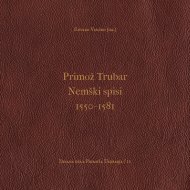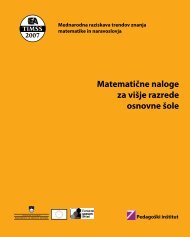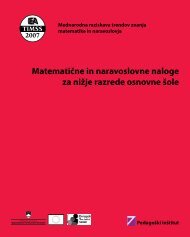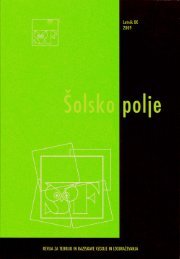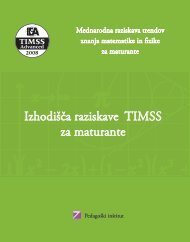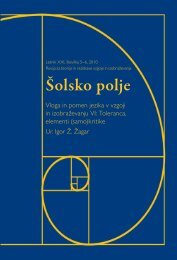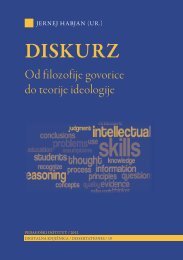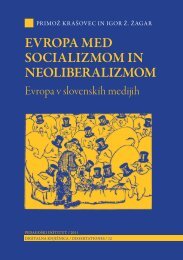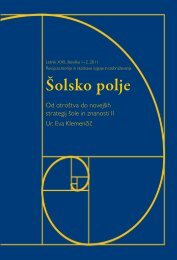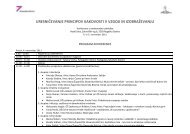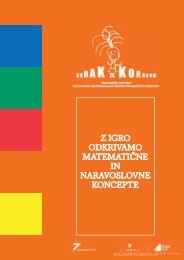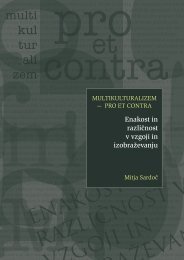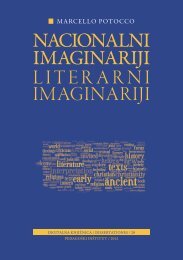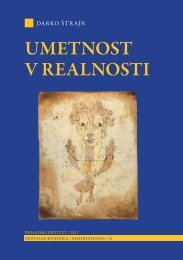158 ŠOLSKO POLJE LETNIK <strong>XX</strong> ŠTEVILKA 5/6ontic and the ontological level. It deals with Foucault’s understanding of discourse in hisarchaeological period. It focuses on the paradoxic idea of the regularity of dispersionof the statements within a discursive formation and brings up the problem of how toindividualize different discourse on the empirical level. As an alternative to the foucaultian‘solution’ the contribution offers Laclau’s theory of discourse which abolishes thedichotomy mentioned above. Laclau’s notion of discourse is perceived as an ubiquitoussocial phenomenon while the logic of discursive fields is interpreted through the totalizinginstance of the empty signifier. The central problem of Foucault’s thesis is that, unlikeLaclau, he does not think the relations between discourses as differential relations. Thisin fact makes for Foucault impossible to think the system of discourses on the ontic level.Keywords: discourse, discursive, discursive formation, statement, empty signifierTOPOI IN CRITICAL DISCOURSE ANALYSISIgor Ž. ŽagarTopos (topoi in pl.) is one of the most widely used concepts from classical argumentationtheory (Aristotle, Cicero). It found its way not only in philosophy, sociology, anthropologyand linguistics, it found its way in everyday life and everyday conversation as well.In this article, I will examine the role that topoi play in Critical Discourse Analysis. Startingwith definitions from Aristotle and Cicero, contrasting them with new conceptualisationsby Perelman and Toulmin, and examining the superficial use of topoi in everydayconversation, I will try to show that Critical Discourse Analysis (especially Ruth Wodak’sDiscourse-Historical Approach) relies mostly on simplified, unreflected use of topoi (asfound in everyday use), thus neglecting much more productive, theoretical elaborationsof the concept.Key words: topoi, warrant, rhetoric, argumentation, Critical Discourse AnalysisTOPOSI V KRITIČNI ANALIZI DISKURZAIgor Ž. ŽagarTopos (množinsko topoi, v slovenski različici tudi toposi) je eden od najbolj uporabljanihkonceptov iz klasične teorije argumentacije (Aristotel, Cicero). Uveljavil se je ne le v filozofiji,sociologiji, antropologiji in lingvistiki, temveč tudi v vsakdanjem življenju in konverzaciji.V tem članku bom raziskal vlogo, ki jo toposi igrajo v kritični analizi diskurza. Začenši zdefinicijami Aristotela in Cicerona, primerjavo z novimi konceptualizacijami Perelmanain Toulmina, in osvetlitvijo površinske rabe toposov v vsakdanji konverzaciji bom skušalpokazati, da se kritična analiza diskurza (zlasti diskurzivno historični pristop Ruth Wodak)v glavnem opira na poenostavljeno, nereflektirano rabo toposov (kakršno najdemo v vsakdanjirabi) in s tem zanemarja veliko produktivnejše, teoretske razdelave tega koncepta.Ključne besede: topoi (toposi), utemeljitev, retorika, argumentacija, kritična analiza diskurza.
POVZETKI / ABSTRACTS159NOVINARSKA (RE)PRODUKCIJA ZGODOVINE: TELEVIZIJSKO POKRIVANJEKARADŽIĆEVE ARETACIJE V SRBIJIKarmen Erjavec in Zala VolčičAretacija bivšega političnega in vojaškega voditelja bosanskih Srbov Radovana Karadžića vjuliju 2008 je pritegnila veliko pozornosti mednarodne skupnosti in ponudila priložnostsrbski javnosti in medijem, da razmislijo o vlogi Srbije med jugoslovanskimi vojnami v1990-tih. Karadžić je kot predsednik samooklicane Republike srbske v Bosni in Hercegoviniobtožen genocida in zločinov proti človeštvu, storjenih v letu 1995. Na podlagi kritičnediskurzivne analize (analiza rekontekstualizacije in analiza reprezentacije družbenih akterjev),trdiva, da so novinarji Televizije Srbija pri poročanju o aretaciji Karadžića reproduciralinacionalistični diskurz tako, da so obudili nostalgijo za Veliko Srbijo. Pri tem soprikrili vsako povezavo med Karadžićem kot posameznikom in Srbi na splošno, še posebejpa povezavo sedanje vlade z vojnimi zločini, obenem pa slavili Srbijo kot superiornonacijo, ki napreduje v vstopanju v Evropsko unijo.Ključne besede: zgodovina, nacionalizem, novinarstvo, Televizija Srbija, kritična diskurzivnaanalizaJOURNALISTIC (RE)PRODUCTION OF HISTORY: TELEVIZED COVERAGE OF RA-DOVAN KARADŽIĆ’S ARREST IN SERBIAKarmen Erjavec and Zala VolčičThe arrest of former Bosnian Serb political and military leader Radovan Karadžić in July2008 triggered a wide-spread interest within international community and provided theopportunity for the Serbian public and its media to reflect upon the role of Serbia duringthe 1990s Yugoslav wars. Karadžić was as a president of the self-proclaimed Serbianrepublic within Bosnia and Herzegovina. He was accused for genocide and crimes againsthumanity in 1995. On the basis of critical discourse analysis (the analysis of recontextualizationand the analysis of representation of social actors), we argue that TelevisionSerbia’s journalists, while covering Karadžić’s arrest, reproduced a nationalistic discourseby invoking nostalgia for Greater Serbia in ways that concealed any connection betweenKaradžić specifically, the Serbs in general, and especially the current government withwar crimes in Bosnia and Herzegovina. At the same time this discourse celebrated Serbiaas a superior nation as it progressed toward inclusion in the European Union.Keywords: history, nationalism, journalism, Television Serbia, critical discourse analysisGLAS OBLASTI, KI (VZ)POSTAVLJA DNEVNI RED – VSEBINSKE ZNAČILNOSTIDISKURZA URADA VISOKEGA PREDSTAVNIKA MEDNARODNE SKUPNOSTI VBOSNI IN HERCEGOVINIDanijela MajstorovićV članku skušamo prikazati nekatere značilnosti retorike Urada visokega predstavnikamednarodne skupnosti v BiH med leti 1996-2005. Študija predstavlja model kritične analizediskurza za izbrani korpus (sporočila za javnost), ki temelji na triangulaciji, pri čemerzdružuje in kontekstualizira perspektive mednarodnih odnosov, postkolonialne teorije,vsebinske analize, korpusnega jezikoslovja in tekstualne analize ter obenem podaja
- Page 3:
VSEBINA LETNIK XX ŠTEVILKA 5/6 Z
- Page 7 and 8:
UVODNA NOTICAIgor Ž. ŽagarTole pi
- Page 9 and 10:
ZA KAJ GRE V KAD - PREGLEDZGODOVINE
- Page 11 and 12:
ZA KAJ GRE V KAD - PREGLED ZGODOVIN
- Page 13:
ZA KAJ GRE V KAD - PREGLED ZGODOVIN
- Page 17 and 18:
ZA KAJ GRE V KAD - PREGLED ZGODOVIN
- Page 19 and 20:
ZA KAJ GRE V KAD - PREGLED ZGODOVIN
- Page 21 and 22:
ZA KAJ GRE V KAD - PREGLED ZGODOVIN
- Page 23 and 24:
ZA KAJ GRE V KAD - PREGLED ZGODOVIN
- Page 25 and 26:
ZA KAJ GRE V KAD - PREGLED ZGODOVIN
- Page 27 and 28:
DISKURZ: FOUCAULT, LACLAU TERZAPOPA
- Page 29 and 30:
DISKURZ: FOUCAULT, LACLAU TER ZAPOP
- Page 31 and 32:
DISKURZ: FOUCAULT, LACLAU TER ZAPOP
- Page 33 and 34:
DISKURZ: FOUCAULT, LACLAU TER ZAPOP
- Page 35 and 36:
DISKURZ: FOUCAULT, LACLAU TER ZAPOP
- Page 37 and 38:
DISKURZ: FOUCAULT, LACLAU TER ZAPOP
- Page 39 and 40:
DISKURZ: FOUCAULT, LACLAU TER ZAPOP
- Page 41 and 42:
DISKURZ: FOUCAULT, LACLAU TER ZAPOP
- Page 43 and 44:
DISKURZ: FOUCAULT, LACLAU TER ZAPOP
- Page 45 and 46:
DISKURZ: FOUCAULT, LACLAU TER ZAPOP
- Page 47 and 48:
DISKURZ: FOUCAULT, LACLAU TER ZAPOP
- Page 49 and 50:
TOPOI IN CRITICAL DISCOURSE ANALYSI
- Page 51 and 52:
TOPOI IN CRITICAL DISCOURSE ANALYSI
- Page 53 and 54:
TOPOI IN CRITICAL DISCOURSE ANALYSI
- Page 55 and 56:
TOPOI IN CRITICAL DISCOURSE ANALYSI
- Page 57 and 58:
TOPOI IN CRITICAL DISCOURSE ANALYSI
- Page 59 and 60:
TOPOI IN CRITICAL DISCOURSE ANALYSI
- Page 61 and 62:
TOPOI IN CRITICAL DISCOURSE ANALYSI
- Page 63 and 64:
TOPOI IN CRITICAL DISCOURSE ANALYSI
- Page 65 and 66:
TOPOI IN CRITICAL DISCOURSE ANALYSI
- Page 67 and 68:
TOPOI IN CRITICAL DISCOURSE ANALYSI
- Page 69 and 70:
TOPOI IN CRITICAL DISCOURSE ANALYSI
- Page 71 and 72:
TOPOI IN CRITICAL DISCOURSE ANALYSI
- Page 73 and 74:
TOPOI IN CRITICAL DISCOURSE ANALYSI
- Page 75 and 76:
TOPOI IN CRITICAL DISCOURSE ANALYSI
- Page 77 and 78:
University of Queensland, Centre fo
- Page 79 and 80:
JOURNALISTIC (RE)PRODUCTION OF HIST
- Page 81 and 82:
JOURNALISTIC (RE)PRODUCTION OF HIST
- Page 83 and 84:
JOURNALISTIC (RE)PRODUCTION OF HIST
- Page 85 and 86:
JOURNALISTIC (RE)PRODUCTION OF HIST
- Page 87 and 88:
JOURNALISTIC (RE)PRODUCTION OF HIST
- Page 89 and 90:
JOURNALISTIC (RE)PRODUCTION OF HIST
- Page 91 and 92:
JOURNALISTIC (RE)PRODUCTION OF HIST
- Page 93 and 94:
JOURNALISTIC (RE)PRODUCTION OF HIST
- Page 95 and 96:
JOURNALISTIC (RE)PRODUCTION OF HIST
- Page 97 and 98:
JOURNALISTIC (RE)PRODUCTION OF HIST
- Page 99 and 100:
JOURNALISTIC (RE)PRODUCTION OF HIST
- Page 101 and 102:
JOURNALISTIC (RE)PRODUCTION OF HIST
- Page 103 and 104:
THE VOICE OF AN AGENDA-SETTINGAUTHO
- Page 105 and 106:
THE VOICE OF AN AGENDA-SETTING AUTH
- Page 107 and 108:
THE VOICE OF AN AGENDA-SETTING AUTH
- Page 109 and 110: THE VOICE OF AN AGENDA-SETTING AUTH
- Page 111 and 112: THE VOICE OF AN AGENDA-SETTING AUTH
- Page 113 and 114: THE VOICE OF AN AGENDA-SETTING AUTH
- Page 115 and 116: THE VOICE OF AN AGENDA-SETTING AUTH
- Page 117 and 118: THE VOICE OF AN AGENDA-SETTING AUTH
- Page 119 and 120: THE VOICE OF AN AGENDA-SETTING AUTH
- Page 121 and 122: THE VOICE OF AN AGENDA-SETTING AUTH
- Page 123 and 124: THE VOICE OF AN AGENDA-SETTING AUTH
- Page 125 and 126: THE VOICE OF AN AGENDA-SETTING AUTH
- Page 127 and 128: THE VOICE OF AN AGENDA-SETTING AUTH
- Page 129 and 130: THE VOICE OF AN AGENDA-SETTING AUTH
- Page 131 and 132: THE VOICE OF AN AGENDA-SETTING AUTH
- Page 133 and 134: THE VOICE OF AN AGENDA-SETTING AUTH
- Page 135 and 136: ‘68 KOT HKRATNA KRIZA EVROPSKEGAZ
- Page 137 and 138: ‘68 KOT HKRATNA KRIZA EVROPSKEGA
- Page 139 and 140: ‘68 KOT HKRATNA KRIZA EVROPSKEGA
- Page 141 and 142: ‘68 KOT HKRATNA KRIZA EVROPSKEGA
- Page 143 and 144: ‘68 KOT HKRATNA KRIZA EVROPSKEGA
- Page 145 and 146: ‘68 KOT HKRATNA KRIZA EVROPSKEGA
- Page 147 and 148: ‘68 KOT HKRATNA KRIZA EVROPSKEGA
- Page 149 and 150: ‘68 KOT HKRATNA KRIZA EVROPSKEGA
- Page 151 and 152: ‘68 KOT HKRATNA KRIZA EVROPSKEGA
- Page 153 and 154: ‘68 KOT HKRATNA KRIZA EVROPSKEGA
- Page 155 and 156: ‘68 KOT HKRATNA KRIZA EVROPSKEGA
- Page 157 and 158: ‘68 KOT HKRATNA KRIZA EVROPSKEGA
- Page 159: POVZETKI/ABSTRACTSZA KAJ GRE V KAD
- Page 163 and 164: POVZETKI / ABSTRACTS161‘68 AS PAR
- Page 165 and 166: AVTORJI/AUTHORSRuth WodakRuth Wodak
- Page 168 and 169: 166 ŠOLSKO POLJE LETNIK XX ŠTEV
- Page 170 and 171: 168 ŠOLSKO POLJE LETNIK XX ŠTEV
- Page 172: ZAHVALARevija Šolsko polje izhaja



